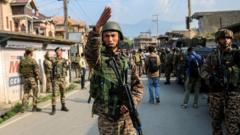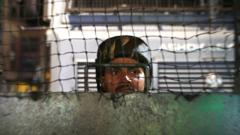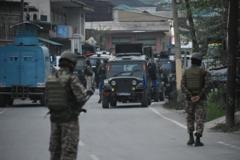Amid rising hostilities, India has conducted strikes in Pakistan and Pakistan-administered Kashmir, asserting accountability for a recent terrorist attack that claimed the lives of 26 individuals in Indian-administered Kashmir. Pakistan has condemned these strikes, labeling them “unprovoked.”
India Launches Strikes in Pakistan Following Deadly Kashmir Attack

India Launches Strikes in Pakistan Following Deadly Kashmir Attack
In a response to violent militant actions, India has initiated "Operation Sindoor," targeting sites in Pakistan, escalating tensions in the region.
In response to a deadly militant attack on tourists in Indian-administered Kashmir, India has executed a series of strikes across Pakistan and Pakistan-administered Kashmir. Known as "Operation Sindoor," the strikes were announced by the Indian defense ministry as a decisive measure to hold accountable those responsible for the April 22 attack that left 25 Indians and one Nepali dead. However, Pakistan's Prime Minister Shehbaz Sharif has decried the attacks as “unprovoked aggression,” insisting that such actions will not go unanswered.
The conflict escalated further as Pakistan's military claimed it had downed five Indian aircraft and a drone during the exchanges. As per reports, at least 26 people were killed, with a further 46 sustaining injuries. Contrarily, the Indian army reported at least 10 civilian deaths due to Pakistani shelling. India claims to have targeted nine locations it identifies as "terrorist infrastructure" while emphasizing that none of their strikes were directed at Pakistani military assets to avoid further escalation.
The strikes were prompted by significant public outrage following the attack in Pahalgam, where militant actions reportedly targeted Hindu tourists directly. Prime Minister Narendra Modi has vowed to hunt down those responsible, although no specific group has been identified in connection with the assault. Indian authorities suspect the involvement of a group linked to Pakistan, a claim that Islamabad adamantly denies, stating it had no role in the incident.
Recent weeks have seen both nations engaging in a series of retaliatory measures, including the expulsion of diplomats and the halting of cross-border access. The conflict over Kashmir has been a longstanding issue since the partitioning of British India in 1947. Historically, both countries have fought wars over the territory, but for many years, the focus has shifted to militant attacks leading to outbreaks of violence.
The latest events mark a critical moment, as they are the first significant civilian attack since India revoked the semi-autonomous status of Kashmir in 2019, which had previously resulted in both protests and a surge in tourism. Past incidents, such as the 2016 surgical strikes and the 2019 Pulwama bombing and subsequent airstrikes, have heightened global awareness of the potential for further military conflict.
International leaders, including UN chief Antonio Guterres and former U.S. President Donald Trump, have urged both nations to show restraint amidst the ongoing turmoil. As tensions between the two nuclear-armed nations remain precarious, the global community watches closely, wary of the risks this conflict presents.





















